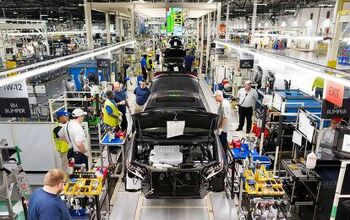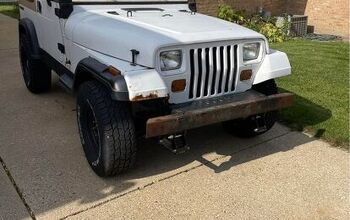Ford to Launch Data Monitoring/Analytics Program on Commercial Fleets

We’ve prattled on before about how General Motors sees data mining as its next big business opportunity. While much of our take focused on the risk that customers might lose their privacy and become both commodity and consumer, it would be stupid to suggest it isn’t also a highly lucrative business strategy.
Social media outlets sell your personal information on a daily basis and other industries see potential in that. GM isn’t the only automaker jumping on the bandwagon, it’s simply the one with the most transparent blueprint.
Ford recently opened up about its own data strategy. The company previously announced large investments into data centers, stating its intent to equip 90 percent of its global fleet with modem connectivity by 2020. Ford Smart Mobility was also reorganized earlier this year, an effort that included the acquisition of two tech firms focused on transit data. The automaker split the group to focus on key areas: transportation data, marketing, tech development, and the management of previously established programs like FordPass and Chariot.
Ford obviously had a plan in the works for a while, but we didn’t know exactly what Ford’s execution would look like until now.
On Thursday, the automaker stated its intent to deliver total percent connectivity across its vehicle lineup, starting with its commercial fleet. Ford Commercial Solutions will introduce two new connected vehicle products designed to provide management with key insights into fleet and driver performance.
“Business owners and operators want to serve their customers, not spend excessive time managing their fleets,” said Lee Jelenic, CEO of Ford Commercial Solutions. “Our goal is to unlock the data from their vehicles to provide them with more effective ways to manage their fleets and improve operations. Our new products are tailored to serve fleets of all types, whether they’re run by law enforcement, composed predominantly of Ford vehicles, or are large multi-make fleets that want more insight from their Ford vehicles.”
While the company’s new “Data Services” product is intended for the management of larger fleets, the tool can focus on an individual vehicle’s GPS location, mileage, fuel consumption, mechanical health, driver behavior, and more. The data can also be amassed and then analyzed to help companies make smarter decisions. Ford said it has reached service agreements with connected-vehicle companies Geotab and Spireon to give fleet operators a choice of what telematics service they prefer, thanks to the automaker’s ongoing partnership with Verizon.
The tool intended for law enforcement is similar, but includes data on carbon dioxide emissions and seatbelt usage. Ford plans to relegate it to police vehicles, instead of commercial variants of the Transit, Transit Connect, and F-Series. While both cloud-based services will be available on newer cars right away, the automaker said vehicles lacking modems will be still be able to take advantage of Ford Commercial Solutions’ products — the company is launching a plug-in device that allows fleets to connect vehicles dating back to the 2012 model year.
Despite the fact that the very mention of data mining is producing Orwellian vibrations at the base of every skeptic’s brainstem, there’s not too much to be alarmed about here. Sure, Ford could theoretically sell the accumulated information to other companies, but we expect every business’ legal team would have something to say about it. What we’re seeing instead is Ford taking useful data from specific companies and then selling it back to them. The worst-case scenario we can imagine is employees taking shorter lunch breaks and fewer side trips on a delivery.
That’s no assurance of what’s to come in the future, though. Ford could pursue GM’s model of personalized in-car marketing and data sales in the coming decade, but we’ll wait to cry wolf once we’ve actually seen one. The company has been very clear that it doesn’t want to get ahead of itself, and hopes to prove the financial viability for all advanced technologies and new businesses.
[Image: Ford Motor Co.]

A staunch consumer advocate tracking industry trends and regulation. Before joining TTAC, Matt spent a decade working for marketing and research firms based in NYC. Clients included several of the world’s largest automakers, global tire brands, and aftermarket part suppliers. Dissatisfied with the corporate world and resentful of having to wear suits everyday, he pivoted to writing about cars. Since then, that man has become an ardent supporter of the right-to-repair movement, been interviewed on the auto industry by national radio broadcasts, driven more rental cars than anyone ever should, participated in amateur rallying events, and received the requisite minimum training as sanctioned by the SCCA. Handy with a wrench, Matt grew up surrounded by Detroit auto workers and managed to get a pizza delivery job before he was legally eligible. He later found himself driving box trucks through Manhattan, guaranteeing future sympathy for actual truckers. He continues to conduct research pertaining to the automotive sector as an independent contractor and has since moved back to his native Michigan, closer to where the cars are born. A contrarian, Matt claims to prefer understeer — stating that front and all-wheel drive vehicles cater best to his driving style.
More by Matt Posky
Latest Car Reviews
Read moreLatest Product Reviews
Read moreRecent Comments
- ToolGuy This thing here is interesting.For example, I can select "Historical" and "EV stock" and "Cars" and "USA" and see how many BEVs and PHEVs were on U.S. roads from 2010 to 2023."EV stock share" is also interesting. Or perhaps you prefer "EV sales share".If you are in the U.S., whatever you do, do not select "World" in the 'Region' dropdown. It might blow your small insular mind. 😉
- ToolGuy This podcast was pretty interesting. I listened to it this morning, and now I am commenting. Listened to the podcast, now commenting on the podcast. See how this works? LOL.
- VoGhost If you want this to succeed, enlarge the battery and make the vehicle in Spartanburg so you buyers get the $7,500 discount.
- Jeff Look at the the 65 and 66 Pontiacs some of the most beautiful and well made Pontiacs. 66 Olds Toronado and 67 Cadillac Eldorado were beautiful as well. Mercury had some really nice looking cars during the 60s as well. The 69 thru 72 Grand Prix were nice along with the first generation of Monte Carlo 70 thru 72. Midsize GM cars were nice as well.The 69s were still good but the cheapening started in 68. Even the 70s GMs were good but fit and finish took a dive especially the interiors with more plastics and more shared interiors.
- Proud2BUnion I typically recommend that no matter what make or model you purchase used, just assure that is HAS a prior salvage/rebuilt title. Best "Bang for your buck"!


































Comments
Join the conversation
I live my life like a canary in a data mine.
They can have my data when they pry it from my cold, dead hands.